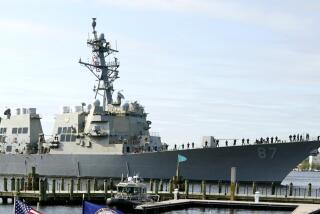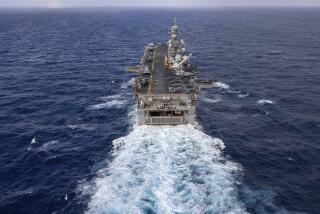Weighing the Risks
- Share via
As the Reagan Administration completes its plans to provide U.S. flag-protection to 11 Kuwaiti tankers carrying oil through the Persian Gulf, the Senate by a 91-5 vote has made clear it wants to be told just what that protection involves and what it portends. The question is simple enough. The answer to it is heavy with military and political implications.
The United States, one of whose vessels has already been attacked in the gulf war zone, is preparing to commit the apparent full power of its regional naval forces to defend the commercial shipping of a third country.
The Senate--the House will probably raise the same issue after the Memorial Day recess--wants to make sure that it’s fully informed before that commitment occurs.
Congress has no quarrel with the objective of keeping the gulf open to vital oil traffic. That has been active American policy for more than six years, ever since the eruption of the Iran-Iraq War exposed neutral shipping in the gulf to air and naval attacks.
But now the Administration proposes to move beyond patrolling by U.S. naval forces in defense of American merchant ships. Now it has signaled that, soon, any attack on a Kuwaiti ship that has been lent the American flag could be regarded as an attack on a U.S. ship. The unmistakable implication is that the United States would respond with military force.
Kuwait’s ships have in fact come under frequent attack from Iran, because Kuwait both helps finance Iraq’s war effort and serves as an entryway for its military supplies.
An American flag flying from a Kuwaiti tanker may or may not prove a disincentive to further attacks. What the Senate wants to know, before that possibility is tested, is exactly how the Administration assesses the risk and how it plans to meet it.
Assistant Secretary of State Richard Murphy has conceded that the Administration’s plan could add a new dimension to the war. The White House was quick to deny this, no doubt fearing that Murphy’s candid statement would be taken to support the view that the new U.S. role in the gulf requires formal notification to Congress under the War Powers Act.
That is something the Administration seeks to avoid, just as it avoided it when Marines were sent to Lebanon in 1982.
Yet it seems obvious that the Navy’s role in the gulf now places it in a situation where, as the act says, “imminent involvement in hostilities is clearly indicated by the circumstances.”
The United States is on the edge of exposing itself more directly than before to the risks of the gulf war. Those risks ought to be honestly acknowledged and Congress should be properly consulted before they are assumed, as the law requires.
More to Read
Get the L.A. Times Politics newsletter
Deeply reported insights into legislation, politics and policy from Sacramento, Washington and beyond. In your inbox twice per week.
You may occasionally receive promotional content from the Los Angeles Times.










